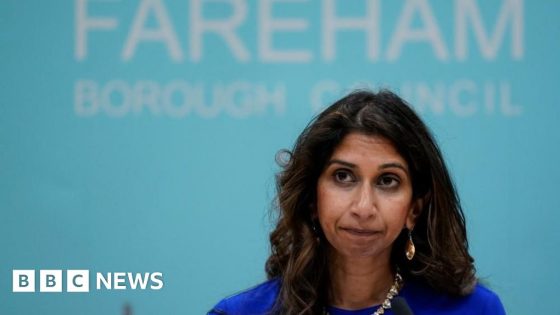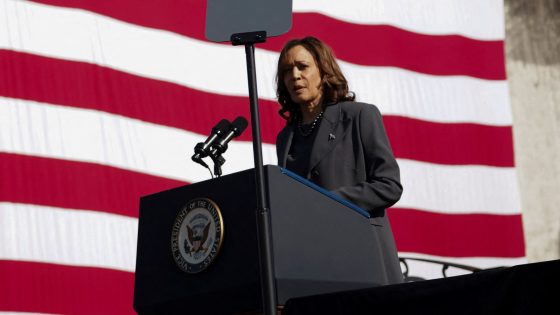It has been a night of high drama in UK politics, one which has transformed the political landscape.
Just waking up? Here are some of the most striking moments you may have missed.
Truss loses by 630 votes
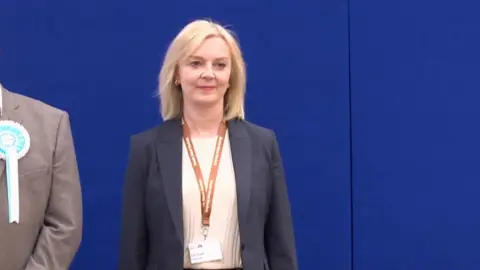
Liz Truss became prime minister 668 days ago. Then, just 44 days later, her own MPs removed her.
On Friday morning, her constituents in South West Norfolk did the same, a fate rarely suffered by a former prime minister.
Ms Truss saw her majority of around 23,000 votes vanish and she was defeated by Labour. There were only 630 votes in it.
As the rest of the candidates stood on the stage waiting for her to arrive, slow-clapping could be heard in the hall.
Mordaunt leads list of Tory cabinet casualties
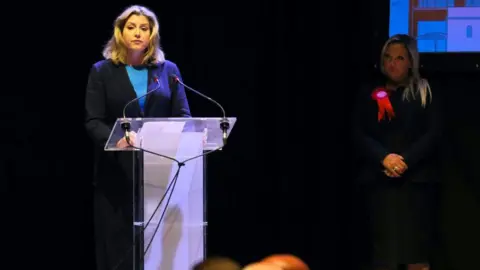 Getty Images
Getty ImagesMordaunt. Shapps. Mercer. These are some of the names which have dominated UK politics in recent years – only to be swept away on a bruising night for the Conservative Party.
Penny Mordaunt – the leader of the House of Commons and once a candidate to be prime minister – saw her majority of more than 15,000 in Portsmouth North overturned by Labour.
She had hoped her personal profile – generated in part by her ceremonial sword-wielding role during the Coronation of King Charles III – would mean her beating the national swing against her party, but Labour won narrowly.
Defence Secretary Grant Shapps held government posts for the majority of the Conservative’s 14 years in power. In the early hours of Friday, he saw a majority of more than 10,000 votes vanish.
Other cabinet ministers removed from the Commons include: Veterans’ Minister Johnny Mercer, Education Secretary Gillian Keegan, Culture Secretary Lucy Frazer and Rishi Sunak’s Chief Whip Simon Hart.
Cull of Tory big beasts reaches backbenches
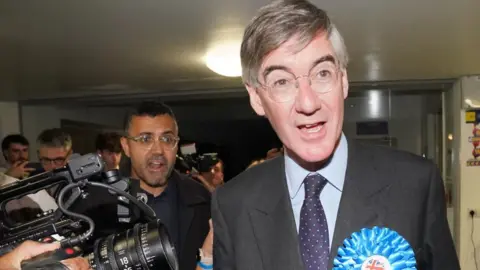 PA Media
PA MediaIt was not just Tories in possession of a seat at the Cabinet table who were unceremoniously removed from Parliament.
Other figures who have held senior posts or who have become high-profile backbench campaigners were also defeated as the swing against their party reached deep into the backbenches.
Perhaps the most striking name was Jacob Rees-Mogg, never far from the limelight during the Brexit debate, who lost his Somerset seat by more than 5,000 votes.
Before his result was announced, he told the BBC his party had taken its “core vote for granted”.
Sir Michael Fabricant, Jonathan Gullis and Dame Therese Coffey all lost.
Starmer all smiles as he basks in the applause
 Reuters
ReutersEven when the opinion polls said a Labour victory was all but certain, Sir Keir Starmer made sure not to look like he thought it was in the bag.
Then, in the early hours of Friday – shortly after his majority was officially confirmed – the soon-to-be prime minister took to the stage in front of jubilant Labour supporters and allowed himself to briefly enjoy the moment.
He told them: “We did it. You campaigned for it, you fought for it, you voted for it, and now it has arrived – change begins now.
“It feels good, I have to be honest.”
Farage wins in Clacton
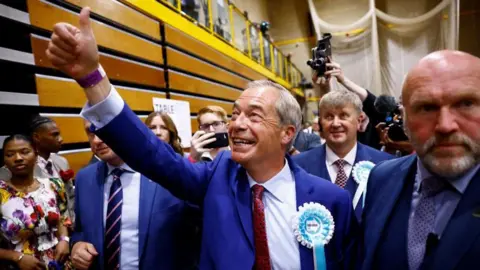 Reuters
ReutersIt was eighth time lucky for Nigel Farage, who was elected to the Commons for the first time with a majority of more than 8,000 in Clacton.
His comeback to the frontline of politics transformed this election and saw Reform UK put on course to be the third largest party in the country by number of votes.
Speaking from the count, Mr Farage said what the campaign had achieved in such a short space of time was “truly extraordinary”.
“It’s not just disappointment with the Conservative Party. There is a massive gap on the centre right of British politics and my job is to fill it,” he said.
Shock Ashworth defeat amid Gaza protest votes
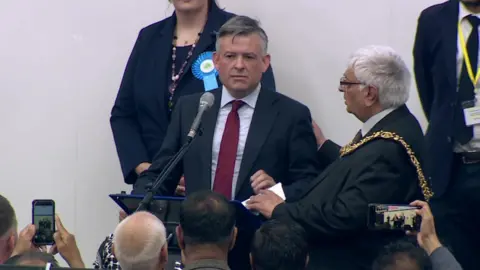
Jonathan Ashworth was almost certain to be a leading figure in the new Labour government.
Instead, the shadow postmaster general and a key Starmer lieutenant lost his Leicester South constituency to independent candidate Shockat Adam.
The seat has a significant Muslim population and a large part of Mr Adam’s campaign focused on the situation in Gaza.
Labour has been criticised from some quarters in recent months over their response to the humanitarian crisis unfolding in the Middle East.
Wes Streeting – who has been the party’s shadow health secretary – narrowly avoided a similar fate in Ilford North, where he held on by little more than 500 votes against a challenge from an independent.
Corbyn defies Labour in Islington North
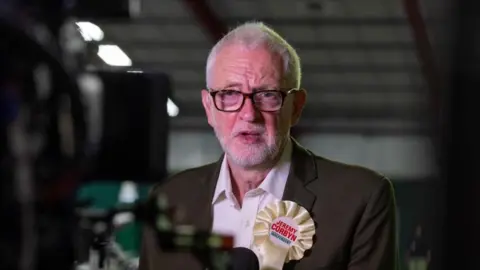 EPA
EPAOn a night when Sir Keir Starmer hoped to confirm a definitive break with the past for Labour, his predecessor had other ideas.
Jeremy Corbyn ran as an independent in Islington North – the constituency he has represented since 1983 – after being thrown out of Labour over his response to antisemitism.
Labour ran a candidate against him but Mr Corbyn’s local popularity meant he won in the north London seat by more than 7,000 votes.
He said the result was a “resounding message from the people of Islington North that they want something different, they want something better and, in the new government that’s coming in, they’re looking for an end to things like the two-child benefit policy cap.”
Sunak says ‘sorry’ as he concedes defeat
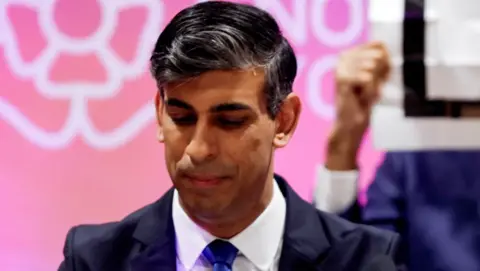 Reuters
ReutersPrime Minister Rishi Sunak did not wait for Labour’s victory to be mathematically confirmed before conceding, instead promising an orderly transfer of power at around 04:00 in his North Yorkshire constituency.
He said: “The British people have delivered a sobering verdict tonight, there is much to learn… and I take responsibility for the loss.”
Mr Sunak addressed Tory candidates who lost their seats, telling them: “I am sorry.”
The “s” word also features in the speech of one of the surviving Tory MPs likely to seek to replace Mr Sunak as Conservative Party leader, should he go.
At her count in Fareham, former home secretary Suella Braverman, told voters who left her party: “I’m sorry that my party didn’t listen to you. The Conservative Party has let you down.”
Source Agencies

